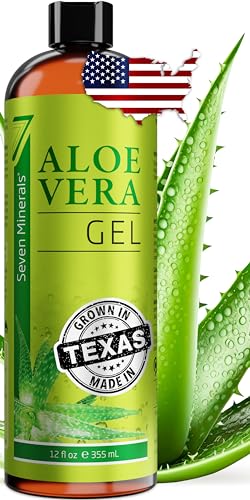
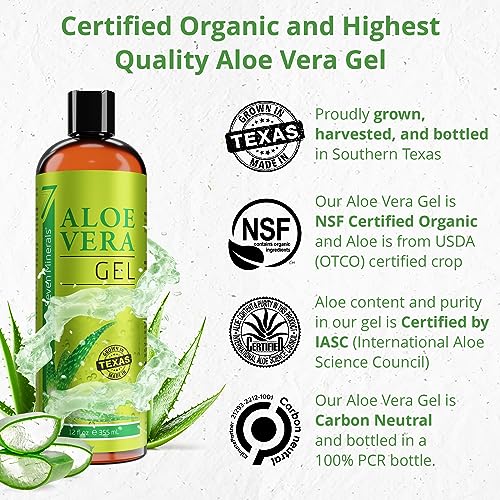
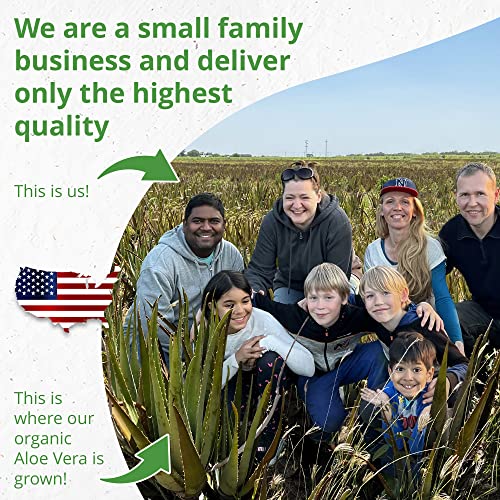
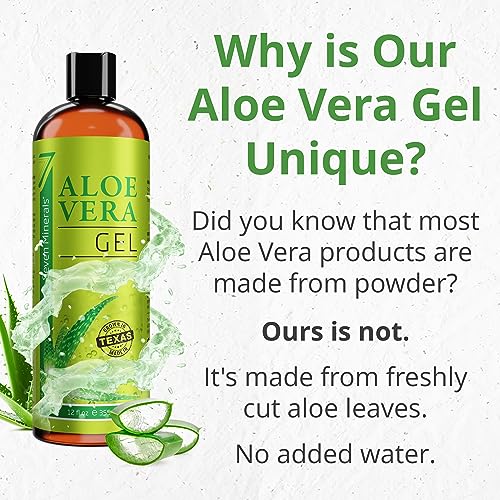
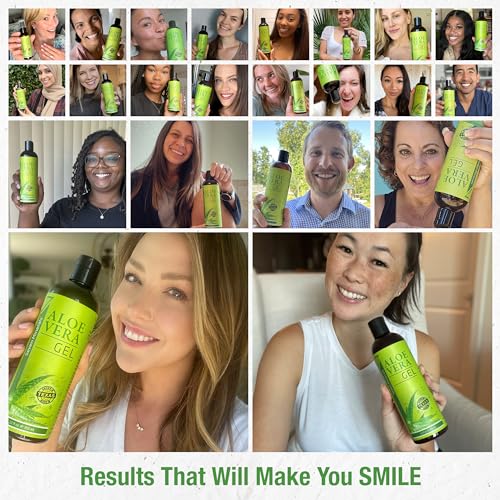
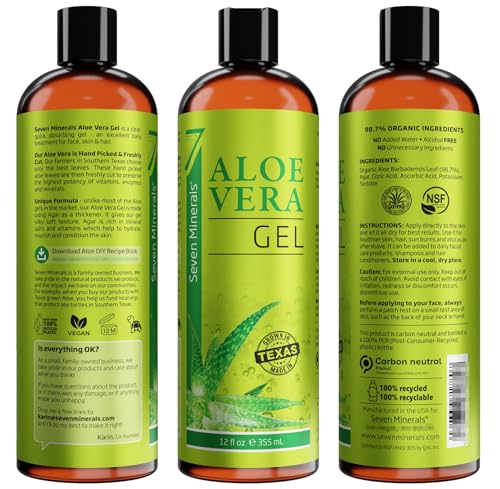
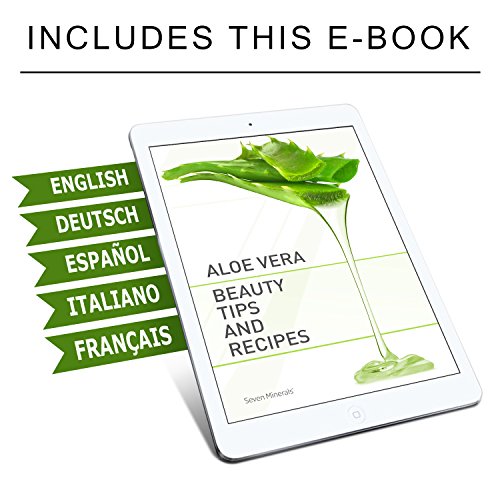
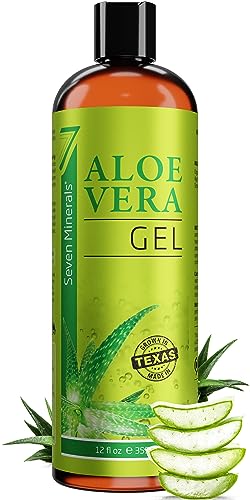
Seven Minerals Organic Aloe Vera Gel - Pure, Vegan Relief for Skin & Hair, 12oz


Citric Acid
Medium RiskCitric acid is an alpha hydroxy acid used in personal care products primarily for its role as a pH adjuster and natural preservative. It occurs naturally in citrus fruits and is commonly utilized in various formulations for its chelating properties and mild exfoliation benefits.
Sustai Insights
Citric acid offers functional benefits as an effective preservative and pH stabilizer, contributing to product longevity and stability. It is biodegradable and derived from renewable sources. Health risks are low, with minimal concerns regarding carcinogenicity, allergies, and reproductive toxicity. However, moderate use restrictions exist due to potential irritation at high concentrations. Environmental risks are limited, as citric acid is not known to accumulate in ecosystems. Regulatory agencies have no significant advisories against its use. Overall, it is assessed as a medium-risk ingredient, with safe usage practices recommended and alternatives available.
Potassium Sorbate
Medium RiskPotassium sorbate is a potassium salt of sorbic acid, primarily used as a preservative in food and cosmetic products. It inhibits the growth of molds, yeast, and some bacteria, extending the shelf life of products. It is commonly found in various formulations due to its effectiveness and low toxicity.
Sustai Insights
Potassium sorbate serves as an effective preservative, preventing microbial growth in food and cosmetic products, which is vital for safety and longevity. Although it has a low risk of carcinogenicity and developmental toxicity, there is a moderate concern regarding allergies and immunotoxicity. Environmentally, it poses minimal risks as it is not significantly bioaccumulative. Regulatory agencies have verified its use, although some products may face restrictions. Overall, it is assessed as a medium risk ingredient, with safe usage practices recommended, and alternatives such as natural preservatives could be considered.
Agar
Low RiskAgar is a dried, hydrophilic, colloidal polysaccharide derived from red algae, primarily used as a thickening agent and gelling agent in food and laboratory applications. It is known for its ability to absorb water and form a gel-like consistency, making it a popular ingredient in various culinary and scientific contexts.
Sustai Insights
Agar serves as an effective thickening and gelling agent, and is biodegradable and sustainably sourced from red algae, contributing to its environmental appeal. Health risks are low, with minimal concerns regarding carcinogenicity, allergies, or reproductive toxicity. Environmental impact is also low, with no significant pollutant or bioaccumulation concerns. Regulatory bodies such as the FDA have no restrictions on its use. Overall, agar presents a low risk profile, making it a favorable ingredient in both food and scientific applications.
Chondrus Crispus (Carrageenan)
Low RiskChondrus crispus, commonly known as carrageenan, is a gelatinous polysaccharide derived from red algae. It is primarily used as a thickening, stabilizing, and gelling agent in food, cosmetics, and pharmaceuticals, providing texture and consistency to various products.
Sustai Insights
Carrageenan offers functional benefits such as effective thickening and stabilizing properties, making it valuable in food and cosmetic formulations. It is considered to have low health risk concerns regarding carcinogenicity, allergies, and reproductive toxicity, though moderate concerns exist for non-reproductive organ toxicity. Environmental impacts are minimal, as it is not known to be bioaccumulative or a significant pollutant. Regulatory bodies have not issued specific restrictions against its use, affirming a low overall risk assessment for this ingredient. Alternatives like agar-agar or pectin may be considered for those seeking substitutes.
Aloe Barbadensis (Aloe Vera)
Low RiskAloe barbadensis, commonly known as aloe vera, is derived from the succulent leaves of the aloe plant. It is widely used in cosmetic products for its soothing and moisturizing properties, often included for its potential skin benefits.
Sustai Insights
Aloe vera provides effective moisturizing and soothing benefits for the skin, supporting its use in various cosmetic formulations. It is generally considered safe, with low concerns for carcinogenicity, allergies, and reproductive toxicity. Regulatory bodies impose minimal restrictions, underlining its low-risk profile. While environmental impacts are minimal, its sustainability credentials depend on sourcing practices. Safe usage includes topical application, with no significant adverse effects reported. Alternatives exist, such as plant-based gels, but aloe vera remains a favored choice due to its low-risk assessment.
Ascorbic Acid (Vitamin C)
Low RiskAscorbic acid (Vitamin C) is a naturally occurring antioxidant essential for various biological functions, including collagen synthesis and immune response. It is commonly used in cosmetic and food products for its preservative properties and ability to enhance skin brightness.
Sustai Insights
Ascorbic acid provides functional benefits as an effective antioxidant and preservative, contributing to skin health and product stability. It is generally recognized as safe with low health risks, including minimal concerns for carcinogenicity and allergies. Environmentally, it poses low risks, as it is biodegradable and does not bioaccumulate. Regulatory bodies like the FDA have not imposed significant restrictions on its use. Overall, the ingredient presents a low risk, with safe usage practices ensuring consumer safety, and alternatives such as natural extracts exist for those seeking different formulations.
Citric Acid
Medium RiskCitric acid is an alpha hydroxy acid used in personal care products primarily for its role as a pH adjuster and natural preservative. It occurs naturally in citrus fruits and is commonly utilized in various formulations for its chelating properties and mild exfoliation benefits.
Sustai Insights
Citric acid offers functional benefits as an effective preservative and pH stabilizer, contributing to product longevity and stability. It is biodegradable and derived from renewable sources. Health risks are low, with minimal concerns regarding carcinogenicity, allergies, and reproductive toxicity. However, moderate use restrictions exist due to potential irritation at high concentrations. Environmental risks are limited, as citric acid is not known to accumulate in ecosystems. Regulatory agencies have no significant advisories against its use. Overall, it is assessed as a medium-risk ingredient, with safe usage practices recommended and alternatives available.
Agar
Low RiskAgar is a dried, hydrophilic, colloidal polysaccharide derived from red algae, primarily used as a thickening agent and gelling agent in food and laboratory applications. It is known for its ability to absorb water and form a gel-like consistency, making it a popular ingredient in various culinary and scientific contexts.
Sustai Insights
Agar serves as an effective thickening and gelling agent, and is biodegradable and sustainably sourced from red algae, contributing to its environmental appeal. Health risks are low, with minimal concerns regarding carcinogenicity, allergies, or reproductive toxicity. Environmental impact is also low, with no significant pollutant or bioaccumulation concerns. Regulatory bodies such as the FDA have no restrictions on its use. Overall, agar presents a low risk profile, making it a favorable ingredient in both food and scientific applications.
Chondrus Crispus (Carrageenan)
Low RiskChondrus crispus, commonly known as carrageenan, is a gelatinous polysaccharide derived from red algae. It is primarily used as a thickening, stabilizing, and gelling agent in food, cosmetics, and pharmaceuticals, providing texture and consistency to various products.
Sustai Insights
Carrageenan offers functional benefits such as effective thickening and stabilizing properties, making it valuable in food and cosmetic formulations. It is considered to have low health risk concerns regarding carcinogenicity, allergies, and reproductive toxicity, though moderate concerns exist for non-reproductive organ toxicity. Environmental impacts are minimal, as it is not known to be bioaccumulative or a significant pollutant. Regulatory bodies have not issued specific restrictions against its use, affirming a low overall risk assessment for this ingredient. Alternatives like agar-agar or pectin may be considered for those seeking substitutes.
Aloe Barbadensis (Aloe Vera)
Low RiskAloe barbadensis, commonly known as aloe vera, is derived from the succulent leaves of the aloe plant. It is widely used in cosmetic products for its soothing and moisturizing properties, often included for its potential skin benefits.
Sustai Insights
Aloe vera provides effective moisturizing and soothing benefits for the skin, supporting its use in various cosmetic formulations. It is generally considered safe, with low concerns for carcinogenicity, allergies, and reproductive toxicity. Regulatory bodies impose minimal restrictions, underlining its low-risk profile. While environmental impacts are minimal, its sustainability credentials depend on sourcing practices. Safe usage includes topical application, with no significant adverse effects reported. Alternatives exist, such as plant-based gels, but aloe vera remains a favored choice due to its low-risk assessment.
Ascorbic Acid (Vitamin C)
Low RiskAscorbic acid (Vitamin C) is a naturally occurring antioxidant essential for various biological functions, including collagen synthesis and immune response. It is commonly used in cosmetic and food products for its preservative properties and ability to enhance skin brightness.
Sustai Insights
Ascorbic acid provides functional benefits as an effective antioxidant and preservative, contributing to skin health and product stability. It is generally recognized as safe with low health risks, including minimal concerns for carcinogenicity and allergies. Environmentally, it poses low risks, as it is biodegradable and does not bioaccumulate. Regulatory bodies like the FDA have not imposed significant restrictions on its use. Overall, the ingredient presents a low risk, with safe usage practices ensuring consumer safety, and alternatives such as natural extracts exist for those seeking different formulations.
Potassium Sorbate
Medium RiskPotassium sorbate is a potassium salt of sorbic acid, primarily used as a preservative in food and cosmetic products. It inhibits the growth of molds, yeast, and some bacteria, extending the shelf life of products. It is commonly found in various formulations due to its effectiveness and low toxicity.
Sustai Insights
Potassium sorbate serves as an effective preservative, preventing microbial growth in food and cosmetic products, which is vital for safety and longevity. Although it has a low risk of carcinogenicity and developmental toxicity, there is a moderate concern regarding allergies and immunotoxicity. Environmentally, it poses minimal risks as it is not significantly bioaccumulative. Regulatory agencies have verified its use, although some products may face restrictions. Overall, it is assessed as a medium risk ingredient, with safe usage practices recommended, and alternatives such as natural preservatives could be considered.
Experience the soothing power of Seven Minerals Organic Aloe Vera Gel, crafted from freshly cut, 100% pure Aloe grown in Southern Texas. This vegan, unscented moisturizer is a versatile addition to your skincare routine, perfect for face, skin, and hair care.
- Natural Healing: Harness the calming properties of Aloe to soothe sunburns, treat cuts, and alleviate irritation from bites and rashes.
- High Purity: Made from real aloe leaves, this gel is one of the purest available, ensuring maximum effectiveness without harmful additives.
- Quick Absorption: With a unique thickener, Agar, this gel absorbs rapidly, leaving skin smooth and non-greasy, ideal for daily use.
- Nourishing Ingredients: Enriched with Vitamin C and natural stabilizers, this gel promotes healthy skin while ensuring a two-year shelf life without harmful preservatives.
- Eco-Friendly Choice: Support sustainable practices with this NSF Organic and IASC certified product, reflecting a commitment to environmental and personal health.
Subscribe & Save with Sustai
- Best Price Guarantee: Always enjoy the lowest prices on sustainable home essentials.
- No Surprises: We’ll notify you before shipping. No hidden fees, ever.
- You’re in Charge: Change, pause, or cancel your subscription anytime with ease.
- Eco-Friendly Deliveries: Our grouped shipments mean less packaging and lower emissions.
Join us on a sustainable journey. Special offers for a limited time! Prices and promotions may change.
Recommended Products
Experience the soothing power of Seven Minerals Organic Aloe Vera Gel, crafted from freshly cut, 100% pure Aloe grown in Southern Texas. This vegan, unscented moisturizer is a versatile addition to your skincare routine, perfect for face, skin, and hair care.
- Natural Healing: Harness the calming properties of Aloe to soothe sunburns, treat cuts, and alleviate irritation from bites and rashes.
- High Purity: Made from real aloe leaves, this gel is one of the purest available, ensuring maximum effectiveness without harmful additives.
- Quick Absorption: With a unique thickener, Agar, this gel absorbs rapidly, leaving skin smooth and non-greasy, ideal for daily use.
- Nourishing Ingredients: Enriched with Vitamin C and natural stabilizers, this gel promotes healthy skin while ensuring a two-year shelf life without harmful preservatives.
- Eco-Friendly Choice: Support sustainable practices with this NSF Organic and IASC certified product, reflecting a commitment to environmental and personal health.

You can have at most 2 Sustainable Steals products in your cart
Customer Reviews
Customers’ View
Customers appreciate the effectiveness and natural formulation of the Aloe Vera Gel, noting its purity and skin-friendly qualities. Many users highlight its rapid absorption and non-sticky texture, stating that it leaves their skin feeling soft and rejuvenated. Positive feedback emphasizes the gel's soothing properties, particularly for sunburn relief and skin irritation, with comments like "my skin just drank it in and feels soft and supple." Additionally, customers value its organic content, acknowledging that it is free from harmful additives and artificial ingredients. Overall, this product is viewed as a reliable option for those seeking a gentle, eco-conscious moisturizer that aligns with health-focused values.
AI-generated from the text of customer reviewsThis product has no reviews yet.




